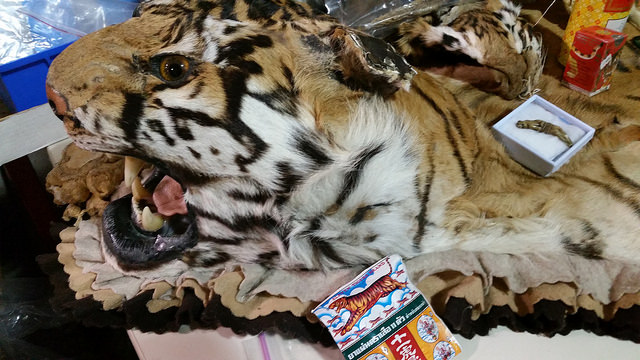威廉王子本月中召集全球交通運輸業龍頭,共同簽署〈白金漢宮宣言〉,誓言阻斷組織性犯罪集團非法運送野生動物的要道。共有澳洲、中國、丹麥、德國、肯亞、日本、利比亞、南非、阿拉伯聯合大公國、英國和美國等11國家的產業界、保育團體和跨政府組織參與。
非法野生動物貿易。攝影:Ryan Moehring;圖片來源:USFWS(CC BY 2.0)。
白金漢宮會場,40位企業負責人、航空公司、物流公司、港口運營商、 海關,跨國組織和慈善保育團體成為國際野生動物杜絕非法交易聯盟宣言(Declaration of the United for Wildlife International Taskforce on the Transportation of Illegal Wildlife Products)的首批簽署者。
誓言內容為改善公司組織間的資訊交流、員工訓練、科技和資訊分享機制。這項宣言是由英國威廉王子所招集,跨時一年多舉行無數的聯合會議、研究後所展現的成果。
威廉王子指出:「盜獵危機為許多脆弱社區帶來暴力、死亡和貪腐問題,威脅到以野生動物觀光為在地經濟核心地區未來世代的生存。」
接著他說:「不過這危機可以解決。我們知道哪裡有野生動物我們必須保護,我們知道哪裡有非法交易市場、哪邊的教育、保育意識及執法層面需要加強。」
「藉由簽署宣言表明對抗野生動物瀕臨絕種的決心,我感謝他們的投入,也邀請其他交通產業界簽屬此宣言,共同打擊盜獵野生動物危機。」
首簽者之一國際自然保護聯盟(IUCN),藉由他們對全球非法盜獵的關心,在3月9日發表一份非法獵殺非洲犀牛的報告,報告指出盜獵犀牛數已經第6年上升,2015年至少1338隻犀牛被殺。
2008年起至少有5940隻犀牛遭獵殺。這次是自近期2008年起獵殺事件浮現後,上升幅度最高的一次。
宣言中致力於採取11個行動方案企圖提高交通產業界對非法盜獵者的警覺心,防止他們利用非法管道,把像是犀牛角等等的非法野生動物產品偷偷從獵殺地運至市場出售,內容包含:
- 發展資訊交流機制,讓交通產業得以接收到關於非法運輸高風險管道和相關運送手法等等有價值的資訊。
- 確保從物流端到海關和執法層面上各環節的資訊傳送機制的安全。
- 通知相關執法單位,查緝可疑非法野生動物產品,如果可以的話,予以禁運。
- 國際上數一數二的大公司承諾協助較貧窮國家建立專業性安全稽查系統。
野生動物保護協會國際政策(Wildlife Conservation Society)簽署了〈白金漢宮宣言〉,該紐約非政府組織,代表經營紐約市五座動物園和水族館。副執行長李柏曼(Susan Lieberman)指出,「全世界已承認非法野生動物為全球問題。今天這項宣言的簽署,相關產業將進一步改善非法運送路線和海關查緝能力。」
瀕臨絕種野生動植物國際貿易公約(CITES)秘書長史坎頓(John Scanlon)表示,「現今每年超過 11億國際觀光客、每天10萬班次的飛機,還有每年5億貨櫃運輸量。國際非法野生動物犯罪集團如今非法交易肆虐,交通運輸相關部門扮演著打擊此非法交易的重要角色。」
史坎頓說:「 非法野生動物交易已成組織規模,不過在實際上海空運輸中,只有少數貨櫃或乘客載運非法取得的野生動物製品,查緝起來有如海底撈針。」
「而長距離海空運送途中需經過很多關卡,意味我們可以從中試圖阻擾。公爵的這項宣言計畫在全球非法運送野生動物所做的努力中,助了一臂之力。」
宣言內容的基礎建立在2015年新成立的夥伴聯盟「降低非法瀕絕野生動物(ROUTES)」上,這個聯盟由美國國際開發署(USAID)創建,英國劍橋所TRAFFIC(wildlife trade monitoring network)領導。
Leaders of the global transportation industry today signed a new declaration pledging to fight wildlife trafficking by disrupting the transport routes being exploited by organized criminals to carry poached wildlife.
During an event at Buckingham Palace, 40 CEOs and other senior officials of airlines, shipping firms, port operators, Customs agencies, intergovernmental organizations and conservation charities became the founding signatories of the Declaration of the United for Wildlife International Taskforce on the Transportation of Illegal Wildlife Products.
They pledged improvements in information sharing, staff training, technology and resource sharing across companies and organizations worldwide.
The Buckingham Palace Declaration is the result of a year’s worth of meetings, research, and coalition building by the United for Wildlife Transport Taskforce, convened by Prince William-Duke Of Cambridge, and chaired at his request by Lord Hague of Richmond.
Prince William convened a unique coalition of industry, conservation groups and intergovernmental bodies based in Australia, China, Denmark, Germany, Kenya, Japan, Liberia, South Africa, the United Arab Emirates, the United Kingdom and the United States.
“The poaching crisis is bringing violence, death, and corruption to many vulnerable communities. It threatens to rob future generations of their livelihoods in those regions where wildlife tourism is the core of local economies,” said Prince William.
“But this crisis can be stopped,” he said. “We know where the animals are that we need to protect. We know where the markets for wildlife products are and where awareness, education, and law enforcement need to be improved. And with the Buckingham Palace Declaration being signed today, global transport leaders are saying we know many of the ways wildlife products are being moved from killing field to marketplace.”
“By implementing these commitments the signatories can secure a game changer in the race against extinction,” said Prince William. “I thank them for their commitment and I invite any other company in the industry to sign up to the Buckingham Palace Declaration and play their part in the fight against the poaching crisis.”
One of the founding signatories is the International Union for the Conservation of Nature, IUCN. With its finger on the pulse of poaching worldwide, the IUCN issued a new report March 9 showing that the number of African rhinos killed by poachers for their horns has increased for the sixth year in a row with at least 1,338 rhinos killed by poachers across Africa in 2015.
This is the highest level since the current crisis emerged in 2008. Since then poachers have killed at least 5,940 African rhinos.
Signatories to the Buckingham Palace Declaration pledged to take 11 actions intended to raise standards across the transportation industry to prevent traffickers from exploiting weaknesses as they seek to move material such as rhino horns covertly from killing field to marketplace.
They will:
• Develop information sharing systems for the transport industry to receive credible information about high risk routes and methods of transportation
• Support a secure system for passing information about suspected illegal wildlife trade from the transport sector to customs and law enforcement authorities
• Notify law enforcement authorities of cargoes suspected of containing illegal wildlife and their products and, where able to do so, they will refuse to accept or ship such cargoes.
The world’s leading transportation firms pledged to assist those in poorer nations who are in need of expertise and new systems.
Dr. Susan Lieberman, Wildlife Conservation Society vice president of international policy and a member of the United for Wildlife Transport Taskforce, signed the Buckingham Palace Declaration today on behalf of the New York-based NGO that manages New York City’s five zoos and aquarium.
“The world is attuned to the fact that wildlife trafficking has become a global problem,” said Dr. Lieberman. “The agreement signed today will help industry take steps to remove the deficiencies in transportation and customs capability that are being exploited by criminal traffickers.”
CITES Secretary-General John Scanlon said today, “There are today over 1.1 billion international tourist arrivals a year, 100,000 flights every day, and 500 million containers shipped a year. Legitimate forms of transport are being exploited by transnational organized criminals to transport their contraband and the transport sector has a key role to play in curbing this illicit trade.”
“The illicit trafficking of wildlife is of an industrial scale, but in the context of the overall volumes of air and sea transport, we are often searching for a needle in a haystack, with only a tiny fraction of the overall cargo or passengers carrying illegally traded wildlife,” said Scanlon.
“Yet poached wildlife travels long distances across air, land or sea and goes through many hands on its way to illicit markets, meaning there are many points along the way where it can be disrupted,” he said. “The Duke’s transport task force has filled a gap in the global efforts to stop illicit wildlife trafficking.”
Today’s declaration builds on a newly formed effort known as ROUTES (Reducing Opportunities for Unlawful Transport of Endangered Species) http://www.traffic.org/routes. The partnership was established in October 2015, funded by the U.S. Agency for International Development and led by TRAFFIC, the wildlife trade monitoring network based in Cambridge, UK.
The founding signatories to the Buckingham Palace Declaration are:
African Airlines Association
Air China Cargo Co. Ltd.
Airports Council International
Baltic and International Maritime Council
China Post Group Corporation
China COSCO Shipping Co. Ltd.
Chinese Wildlife Conservation Association
Convention on International Trade in Endangered Species
Cruise Lines International Association
Danish Shipowners Association
DHL UK & Ireland
DLA Piper
Dubai Ports World
Emirates Airline
Etihad Airways
Hamburg Sud
International Air Transport Association
International Airlines Group
International Association of Dry Cargo Shipowners
International Chamber of Shipping
International Maritime Organization
James Fisher
Japanese Shipowners’ Association
Kenya Airways
Maersk Group
Liberian Shipowners’ Council Ltd
Qantas
Qatar Airways
South African Airways
Stena Line UK
Stolt-Nielsen Ltd.
Sustainable Shipping Initiative
TRAFFIC
UK Chamber of Shipping
UK Foreign & Commonwealth Office
United Nations Development Programme – Global Environment Facility
Wildlife Conservation Society
World Customs Organisation
World Wildlife Fund, UK
※ 全文及圖片詳見:ENS







